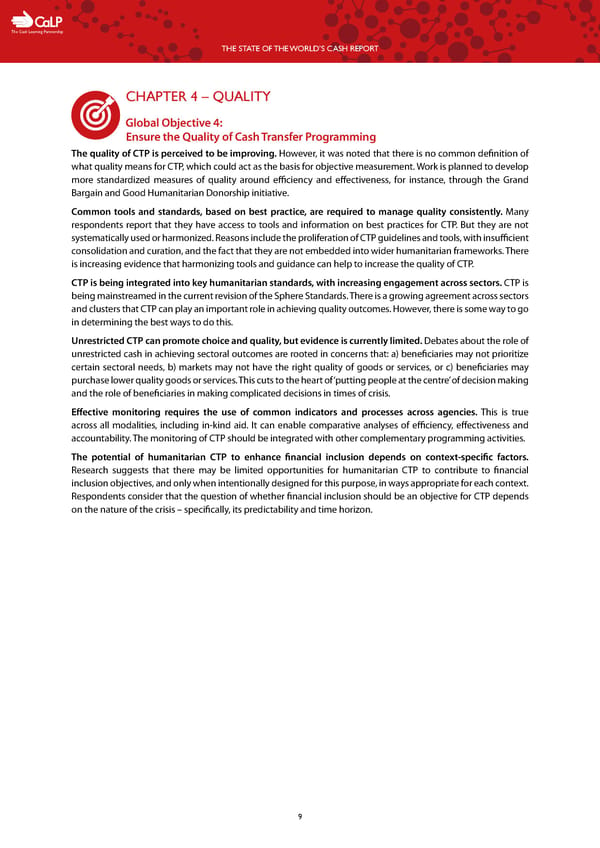C The Cash Learning Partnership THE STATE OF THE WORLD’S CASH REPORT CHAPTER 4 – QUALITY Global Objective 4: Ensure the Quality of Cash Transfer Programming The quality of CTP is perceived to be improving. However, it was noted that there is no common definition of what quality means for CTP, which could act as the basis for objective measurement. Work is planned to develop more standardized measures of quality around efficiency and effectiveness, for instance, through the Grand Bargain and Good Humanitarian Donorship initiative. Common tools and standards, based on best practice, are required to manage quality consistently. Many respondents report that they have access to tools and information on best practices for CTP. But they are not systematically used or harmonized. Reasons include the proliferation of CTP guidelines and tools, with insufficient consolidation and curation, and the fact that they are not embedded into wider humanitarian frameworks. There is increasing evidence that harmonizing tools and guidance can help to increase the quality of CTP. CTP is being integrated into key humanitarian standards, with increasing engagement across sectors. CTP is being mainstreamed in the current revision of the Sphere Standards. There is a growing agreement across sectors and clusters that CTP can play an important role in achieving quality outcomes. However, there is some way to go in determining the best ways to do this. Unrestricted CTP can promote choice and quality, but evidence is currently limited. Debates about the role of unrestricted cash in achieving sectoral outcomes are rooted in concerns that: a) beneficiaries may not prioritize certain sectoral needs, b) markets may not have the right quality of goods or services, or c) beneficiaries may purchase lower quality goods or services. This cuts to the heart of ‘putting people at the centre’ of decision making and the role of beneficiaries in making complicated decisions in times of crisis. Effective monitoring requires the use of common indicators and processes across agencies. This is true across all modalities, including in-kind aid. It can enable comparative analyses of efficiency, effectiveness and accountability. The monitoring of CTP should be integrated with other complementary programming activities. The potential of humanitarian CTP to enhance financial inclusion depends on context-specific factors. Research suggests that there may be limited opportunities for humanitarian CTP to contribute to financial inclusion objectives, and only when intentionally designed for this purpose, in ways appropriate for each context. Respondents consider that the question of whether financial inclusion should be an objective for CTP depends on the nature of the crisis – specifically, its predictability and time horizon. 9
 The State of the World's Cash | Full Report Page 10 Page 12
The State of the World's Cash | Full Report Page 10 Page 12